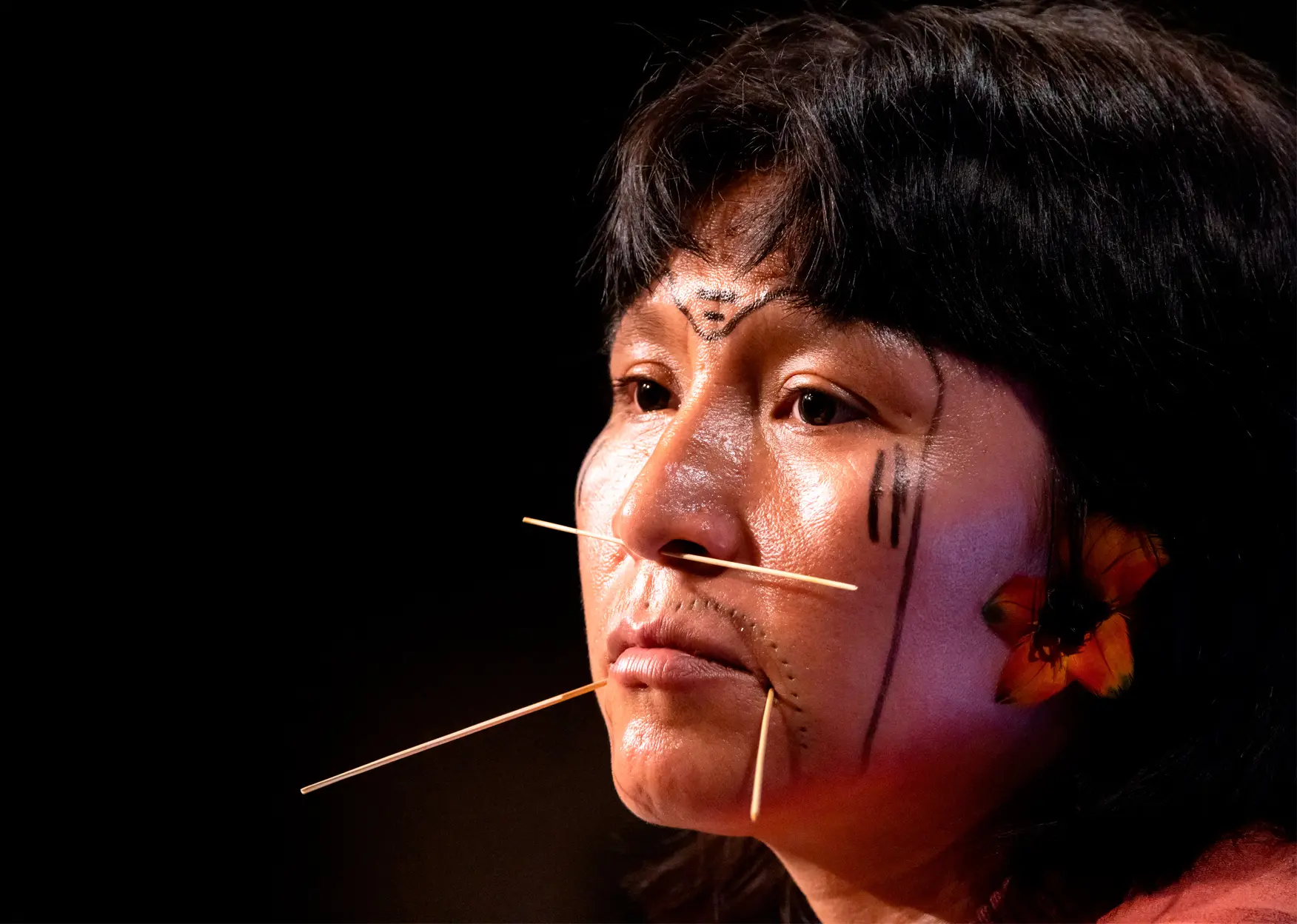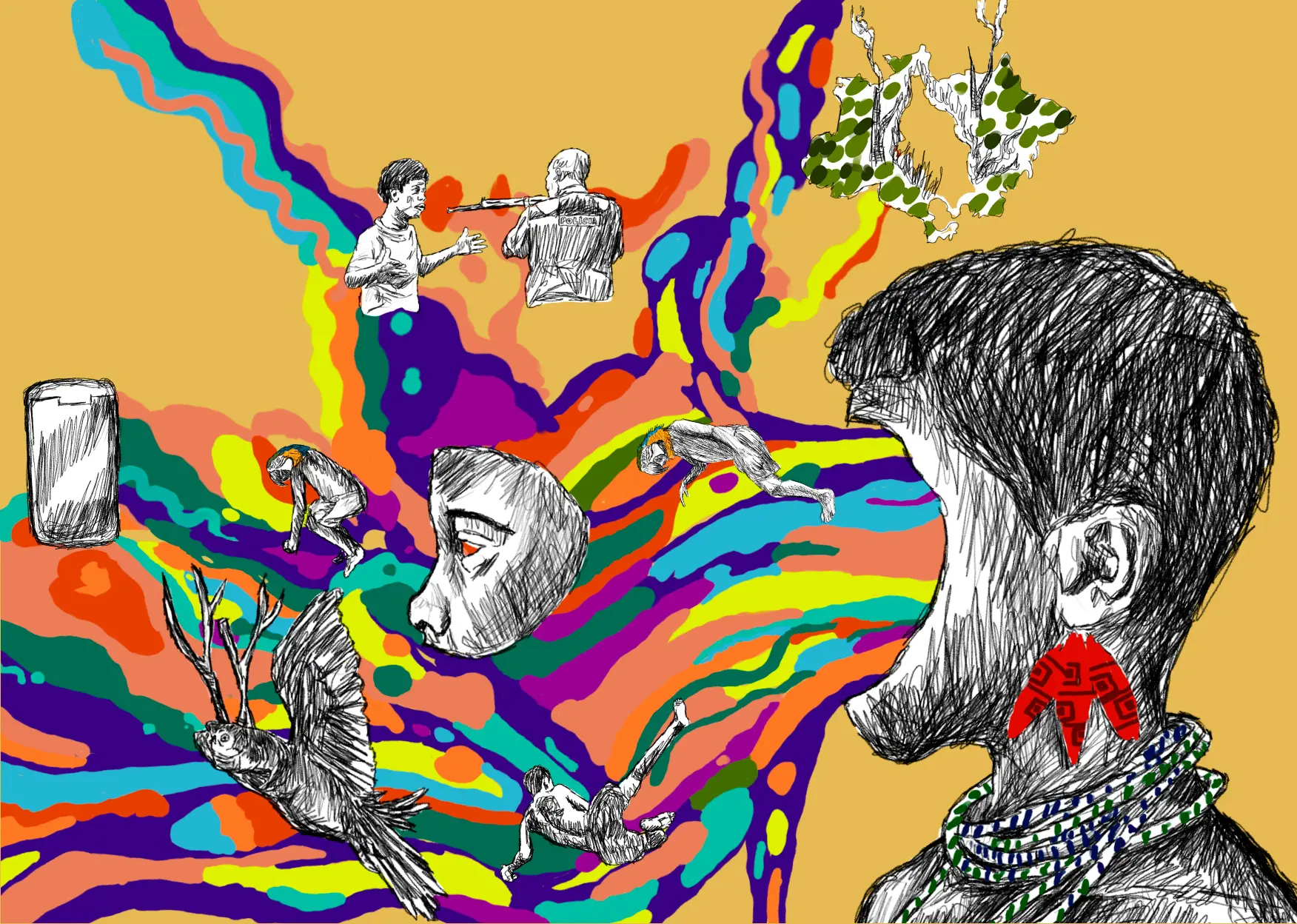Dear Community,
In the last few weeks, we have watched Congress weaken the Ministry of Environment and Climate Change and decide that the Ministry of Indigenous Peoples does not have the authority to decide on demarcation of indigenous lands. We have watched all of this happen with the blessing of President Luiz Inácio Lula da Silva (Workers’ Party). We have seen no attempt whatsoever from Workers’ Party ministers and pro-government deputies and senators to block the destruction. And we are looking at a press that mostly reduces these movements down to a game of politics played on a small board. It wasn’t Lula who was “put in check by Congress.” It was us and everyone else.
This is a huge part of this tragedy. It seems there is no way to take the climate crisis out of the ghetto and bring it to the center of the debate. Far too few people understand that acts of Congress compromise the survival of our own and other species, by tearing the ability to protect nature and peoples-nature away from the two ministries with direct connections to their protection. Nor do people appreciate that this is being done at – perhaps – the last chance to stop the Amazon forest from reaching a point of no return.
People still do not understand that the days are running out to stop global warming. They think it all boils down to a game of winners and losers, a routine that is already a mainstay on the paltry stage of Brasília. Now, the Workers’ Party and pro-government legislators say they “had no alternative, it’s governability.” We are the ones with no alternative. We must fight the urge to say these politicians’ names – the ones who did this, agreed to this, and allowed it to happen – will go down in history as villains, because there may not be any history.
How many catastrophes, the ones called “extreme events,” are needed for them to understand it is almost too late to stop the accelerating climate crisis and extinction of biodiversity that will condemn us to a planet unfit for humankind and for many other kinds? How many droughts and floods, how many mass migrations, how many exterminated species will be necessary to move the climate crisis out of the ghetto and to rise up against those who decree our death?
No, don’t talk to us about “governability.” Governability has been the rubber stamp for too many horrors in Brazil in recent years. “Governability” has blood on its hands. Claiming governability will save no one from extinction.
Those who see the scale of the crisis that we call a “climate” emergency wake up in a panic, because our existence is in the hands of people who say moronic things like: Indigenous people “don’t live off of worms” or “are enslaved by the left” or “want to live like white people.” Phrases like these were uttered by legislators while they were passing the atrocity known as the “marco temporal” (an unjust cut-off point for indigenous demarcation) in the Chamber of Deputies. Those who do find their lives are in the hands of this breed of people, who belch out ignorance with the certainty they are doing a fabulous job.
The idea of only letting lands be demarcated based on whether Indigenous people were occupying their territories on October 5, 1988, the date when the Constitution was enacted, is already a perversion that deserves psychiatric evaluation. If Indigenous people were not on the lands that their ancestors had lived on for centuries or even millennia, it is not because they were sleeping in the gutters of the closest city for fun, but because they were expelled by those who illegally appropriated their lands.
If Lula is the president, the facts show that what is continuing to set us on a path toward the climate abyss is a Congress with a Bolsanarist mentality. The current Congress, even worse than the last, is an embarrassment. Watching sessions is the fastest route to depression, because it’s not just that most legislators vote based on what’s good for themselves – with no thought of the common good, as would be expected – it’s that they are dumb too, they say unbelievable things, they put on a pathetic show. We need to stop calling men who think only of their own profits and personal advantages “conservatives.” Proclaiming oneself to be a conservative is a cheap trick, to gloss over their personal project of enrichment. It would be great if they were actually conservatives, because then there would be conviction, principles, and intelligence for a real debate. Yet for the most part, that is not the case. Most of this Congress – the Chamber and the Senate – is made up not of conservatives, but of predators.
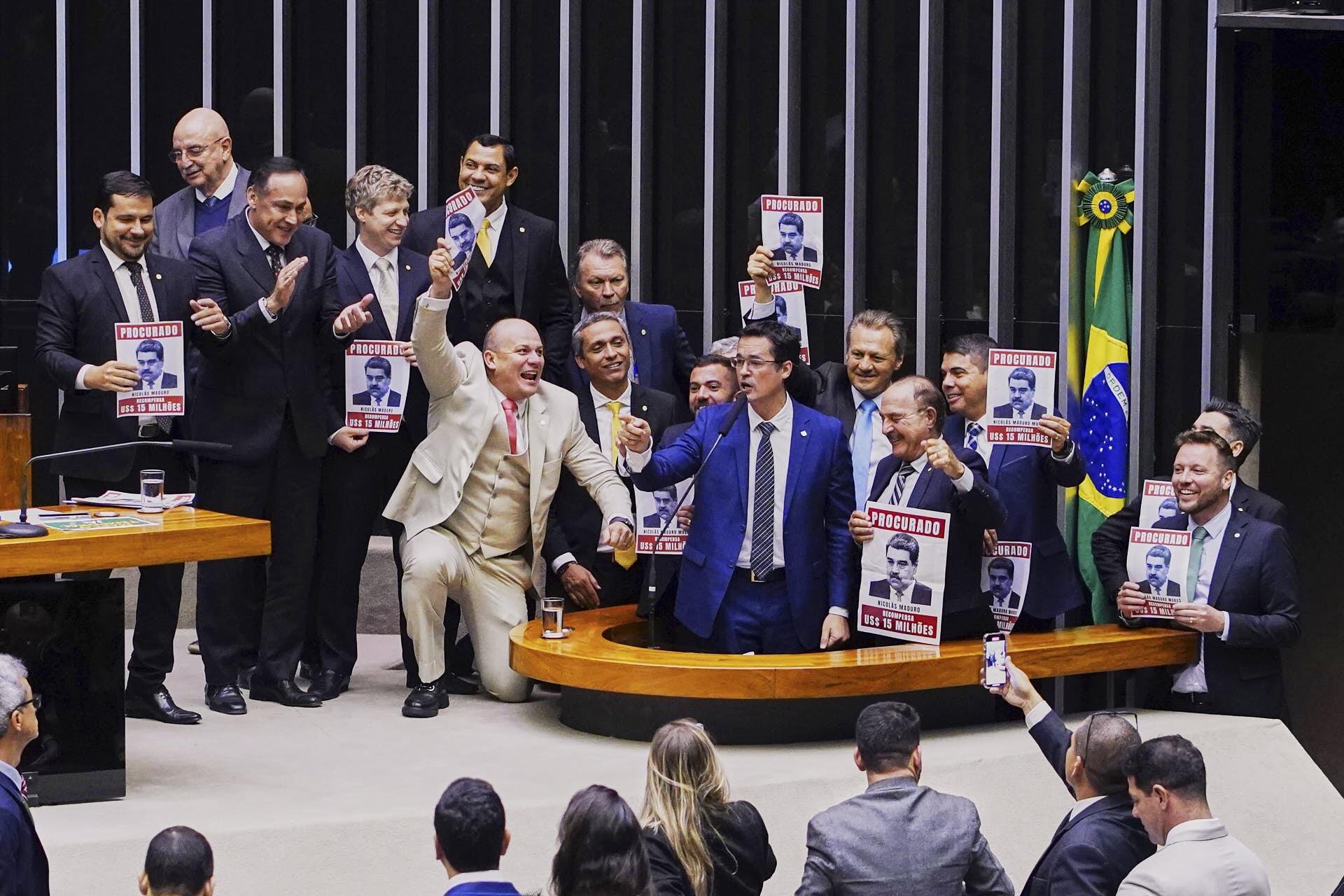
In a pathetic show, impeached deputy Deltan Dallagnol and right-wing legislators laugh and hold signs showing the face of Venezuela’s president, Nicolás Maduro, who Lula welcomed on the day that the Chamber passed PL 490, the bill instituting the time limit trick. Photo: Pablo Valadares/Câmara dos Deputados
It is, however, important to remember that these guys – and most of them are men – were elected and are therefore legitimately serving. It’s a shame, but these are the kinds of people the public chose to represent them. It would be infinitely worse if it were a dictatorship, a direction in which the extreme-right government of Jair Bolsonaro was headed, because then there would not even be any checks and balances. And checks and balances are exactly what Bolsonaro and his gang tried so hard to eliminate, just as the January 8 rioters wanted to do by overthrowing the government.
Because there are still checks and balances, this Wednesday the Federal Supreme Court will resume judgment on the historic cut-off point, giving us a chance to bury this aberration instead of the planet. It has been proven that the Amazon forest along with other biomes, like the Cerrado, Pantanal, Caatinga, Atlantic Forest, and Pampa, have resisted best where there are Indigenous and traditional populations. So our lives also depend on this decision.
We are at a crucial moment. Not just for Indigenous people, not just for Brazilians, but for humanity. Not just for human beings, but also for non-human beings. It must be scary to live in any other country in the world and know that the survival of the Amazon, the great climate regulator, lies in the hands of men who do not have even a basic understanding of the climate crisis, nor are they interested in having one. If we could understand the language of other species, maybe we could hear their horrified screams.
A lady selling popsicles saw a four year old boy going to buy a popsicle by himself at a club: “Where’s your mom?” The boy answered: “She’s over there.” Then she asked: “Where’s your dad?” And the boy replied: “He died in the war.” That boy is the son of Bruno Pereira, the Indigenous expert murdered one year ago, on June 5, 2022, along with British journalist Dom Philips, in the Javari Valley, in the Amazon. His mother is anthropologist Beatriz Matos. She told this story during a conversation SUMAÚMA held with her and Alessandra Sampaio, Dom’s widow.
The boy is right. His dad died in the biggest war of our time, possibly of all time, the war waged against nature. His dad was on the front line, as are the Indigenous people occupying Brasília today. There will be fewer orphans if more people join forces now, right now, in the trenches of nature against the besuited predators.
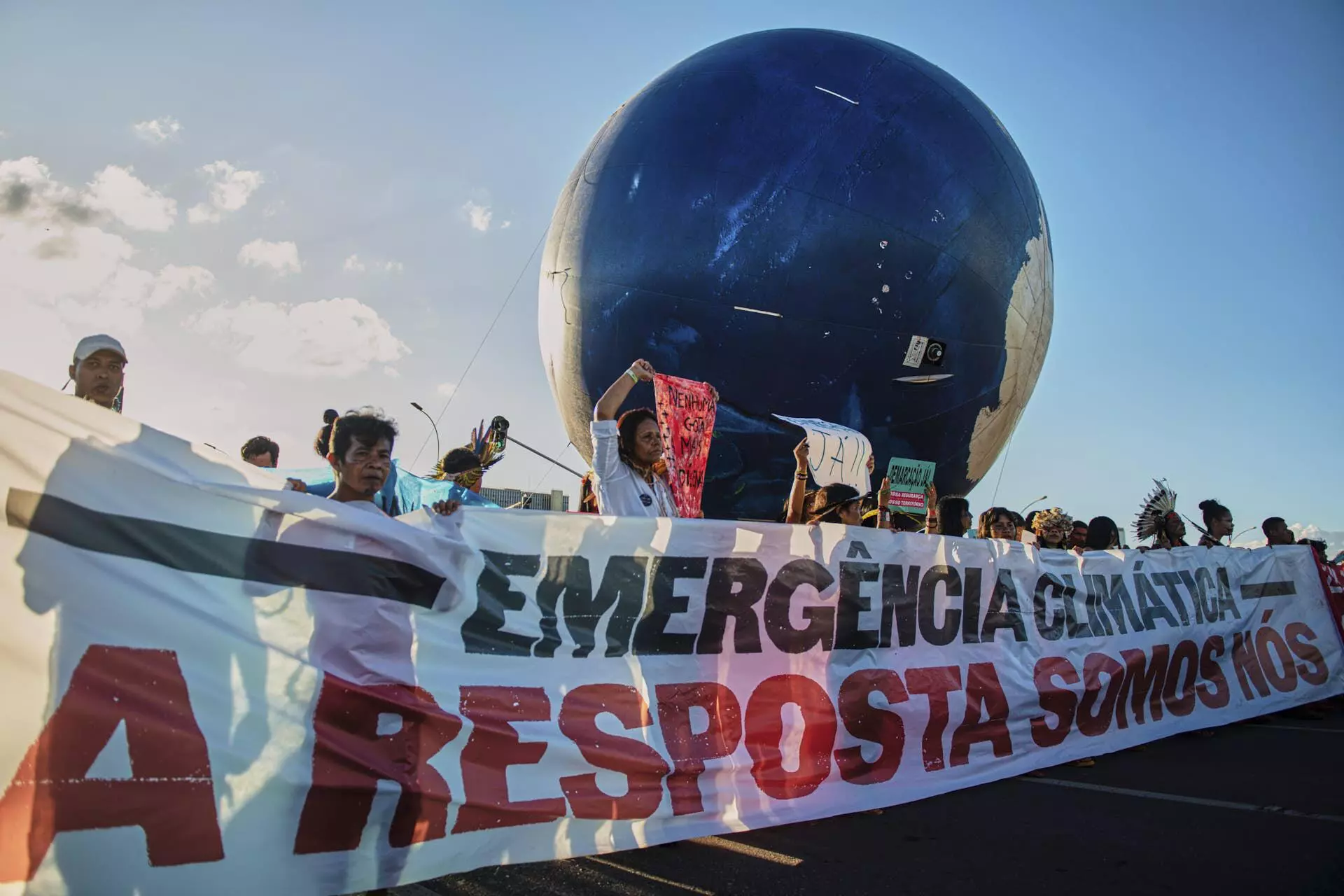
In the biggest war of our time, the war waged against nature, we are all needed in the trenches. Photo: Matheus Alves/SUMAÚMA
SUMAÚMA, a trilingual platform based in Altamira, in the Xingu basin of the Amazon, is fighting this war on the front lines, doing journalism from the center of life. Those in our trenches, nature’s trenches, are being massacred. The Amazonian summer is arriving, a time of little rain, and with it comes renewed criminal forest fires. On Monday, June 5, World Environment Day, Minister Marina Silva launched the Action Plan to Prevent and Control Deforestation of Brazil’s Legal Amazon. Marina fought with everything she had left, but it will be much harder to do what is needed to stop the destruction after her own Ministry of Environment and Climate was weakened, as was leader Sonia Guajajara’s Ministry of Indigenous Peoples. Deputies and senators had taken a chainsaw to ministries directly connected to protecting nature.
Much more oversight and collective mobilization is needed if we want to stand a chance. Much more international pressure is needed, along with boycotts of Brazilian products of deforestation, because the predators in Congress will only stop when their decisions against the environment hurt the bottom lines of those financing them. These deputies, senators, and some government ministers do not seem to care about the next generation, despite having children at home. These besuited fortune hunters live only in the immediate present. Campaigns must be stepped up at the next election to democratically install a Congress that cares about the common good. But there is no time to wait, action is needed now.
Our team goes above and beyond each day so that our readers can position themselves based on quality and in-depth information on the war against nature. This newsletter that you are receiving today is our biggest over these last nine months of SUMAÚMA’s existence. The last few weeks have seen harsh attacks against nature and its peoples, and our team is working hard to publish the latest reports with context and rigor, so that our readers have the tools to take a position.
In this edition you will find special reporting by Ângela Bastos, who visited the Xokleng lands in Santa Catarina, the Indigenous people at the center of the ruling on the “marco temporal” (cut-off point for indigenous demarcation), which the Federal Supreme Court will take up again on Wednesday. Rafael Moro Martins, our special reporter in Brasília, has put together a Q&A on this unjust ruse, to keep sophisticated legalese from preventing or hindering you from building a solid opinion on what is at stake in what the Indigenous people are calling the “judgment of the century.”
This week in particular has been pretty tough for us here at SUMAÚMA, but for another reason: June 5 marks one year since the brutal murder of Bruno Pereira and Dom Phillips. Dom was a personal friend to some of us. Bruno was a wellspring, a reference in dedication to the Amazon and to Indigenous peoples. To help in building their memories, SUMAÚMA brought together Beatriz Matos and Alessandra Sampaio in Brasília for a conversation. Our readers followed this dialog filled with moments of tenderness, intelligence, and kindness from these women who were made war widows, in a report by our co-founder Verónica Goyzueta, along with a 16 minute video.
There’s much more. SUMAÚMA only publishes essential news and we hope you will continue to honor us with your reading, because you won’t find anything trivial or disposable here. I would also like to recommend you take the time to read the first-person text written by Patri, a Venezuelan immigrant who worked as a prostitute in brothels at mines in Yanomami Indigenous Lands. You won’t regret it. Patri is a writer and documented what she saw, experienced, and heard in her handwritten notebooks, illustrated with drawings of the situations she went through. Reading Patri’s first-hand story gives us a much better understanding of what goes on in Yanomami Indigenous Lands – and of women’s experience in this brutal context.
We’re going to take a few days to gather our strength and we’ll be back next week. Let us all move forward together in our commitment to life.
Eliane Brum
Sower of SUMAÚMA
Translation into Spanish: Meritxell Almarza
English translation:Sarah J. Johnson
Photography editing: Marcelo Aguilar, Mariana Greif and Pablo Albarenga
Page setup: Érica Saboya
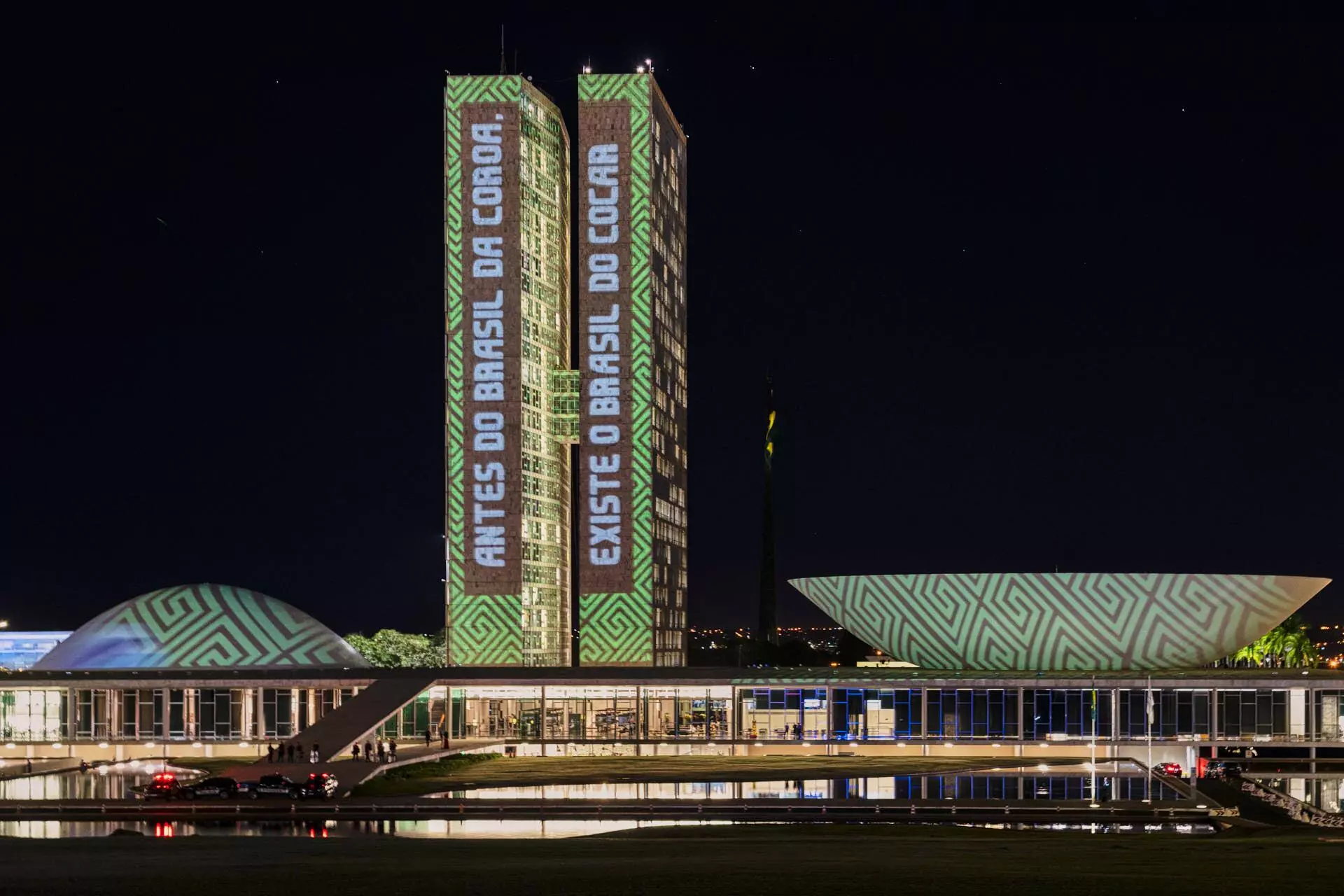
The National Congress put together an offensive against the environmental agenda of the Lula administration, undercutting the Ministry of Environment and Climate Change and the Ministry of Indigenous Peoples. Photo: Fernando Martinho/SUMAÚMA

